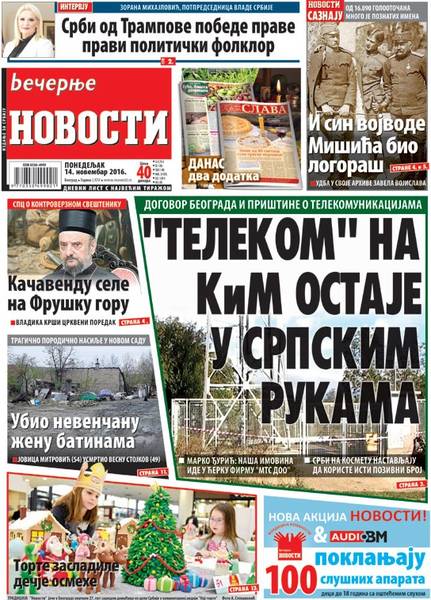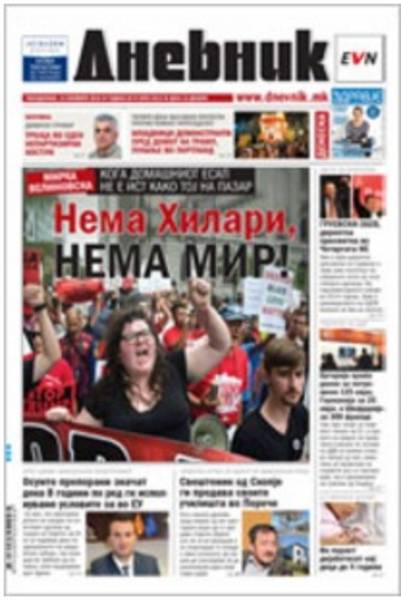Trump Forebodes the End of Normalcy
Adelina Marini, November 14, 2016
 The outcome of the US presidential elections continue to be the main topic in media of the countries from the former Yugoslavia. Following the many analyses, Croatian media designate special space to the presidential elections in Bulgaria as well, which are being totally ignored in other countries of the region. “We have joined the EU long time ago, why continue to be normal?” is the headline of an analysis by Jurica Pavičić for Jutarnji list, which starts with Trump and finishes with the hottest current problem in the Balkans – the policy shift regarding war crimes, committed during the war in former Yugoslavia. The author writes that the concept of normalisation has happened in Croatia under outside pressure. Despite that, however, this concept has brought Croatia more good than bad.
The outcome of the US presidential elections continue to be the main topic in media of the countries from the former Yugoslavia. Following the many analyses, Croatian media designate special space to the presidential elections in Bulgaria as well, which are being totally ignored in other countries of the region. “We have joined the EU long time ago, why continue to be normal?” is the headline of an analysis by Jurica Pavičić for Jutarnji list, which starts with Trump and finishes with the hottest current problem in the Balkans – the policy shift regarding war crimes, committed during the war in former Yugoslavia. The author writes that the concept of normalisation has happened in Croatia under outside pressure. Despite that, however, this concept has brought Croatia more good than bad.
“If it wasn’t for the process of normalisation, if it wasn’t for colonial, utopian political fantasies of Euro-Atlantic integration, Norac would have never been tried for a war crime, Bosnia-Hercegovinian war lords would have never been sent to The Hague, the Prosecution would never have opened up the corruption ball from the Sanader years, minorities in Croatia would never have had such institutionalised rights, and in the cultural sense Croatia would have remained at the late 1990-s level”, writes Jurica Pavičić and continues that if it wasn’t for the Euro-Atlantic mantra, Serbs would have never found out that Srebrenica had happened at all. The US elections, however, put an end to a long process of de-normalisation
“All of the civilisation degradation, in which Croatia, Serbia, and BiH walk in, holding hands like brethren, unfortunately demonstrates that the magic concept of normalisation was never a process of actual internal moral maturing and expansion of horizons. It is obvious that the normalisation of the 2000’s was just some temporary effort, pushed through using blackmail by an outside authority, a reflex left from the colonial subverted state”, believes the author. Symptomatic for this are the latest bouts of tension, due to the arrest of Croatian veterans in BiH, who have been charged with war crimes, and the reactions of the political elite in Zagreb, headed by President Kolinda Grabar-Kitarović.
Vecernji list reports that there are expectations that a decision will be made at the gathering of the European People’s Party today and tomorrow in Brussels, that the Serbian Progressive Party (SNS) of Prime Minister Aleksandar Vučić is accepted in the ranks of Europe’s largest political family. Opposition to the acceptance of SNS was stated by the former foreign minister of Croatia and currently international secretary of the ruling HDZ party Miro Kovać. “My personal opinion is that, due to a number of reasons, at this exact moment no such decision should be supported”, said Mr Kovać for the newspaper, which underlines that for such a decision to be adopted there is no need for consensus.
Both largest daily newspapers – Jutarnji and Vecernji report on the just finished presidential elections in Bulgaria. Jutarnji spends time on the commitment of Prime Minister Boyko Borissov to resign due to losing the elections, but at the same time comments that the victory of the 53-year old general Radev could pull Bulgaria closer to Russia and thus cause discontent in the EU and NATO. The newspaper quotes the general’s words that he does not intend to pull the country away from NATO and the EU. Vecernji list also wonders how the EU would react. Under the headline of “Rumen Radev wins the presidential elections, Bulgaria moves closer to Russia?”, the newspaper prints a brief resume on the election result.
The big piece of news in Serbia this morning is the agreement reached between Belgrade and Priština on telecommunications. In an interview for RTS, the director of the Office for Kosovo and Metohija Marko Đurić explains that the agreement allows for a three-digit area code for the geographic area of Kosovo and Metohija and that it will have positive impact on relations with Priština and the EU. This news is at the front page of Vecernje novosti, which on the other hand runs an interview with Deputy Prime Minister Zorana Mihajlović, who finds reactions to the US elections unacceptable. “When I see some headline like ‘Trump, You Serb’, ‘Trump returns Kosovo to us’, ‘Karić connects Trump and Putin’, when I listen to some politicians explaining Trump’s victory, and when I see how Vojislav Šešelj, which I do feel good about, becoming the greatest pro-American politician in Serbia, and I go into shock, as did recently explain Prime Minister Vučić. I read, I watch, and I feel ashamed of so much superficiality and ignorance”, says Mrs Mihajlović.
At the reminding that Šešelj was the only one in Serbia to openly support Trump she replies: “True, as is the fact that following those elections Mr Trump became the president-elect of the USA, while Vojislav Šešelj remained a provincial politician from Batajnica”. Blic reports today that Serbia has some serious lag on Kosovo regarding lobbyism in the USA. Lana Gedošević comments that the Serbian “lobbyist train” is running seriously late in comparison to the Kosovo one with Serbia having not even chartered a lobbying company yet, which is to stand for Serbian interest in Washington. .
As opposed to Serbia, Kosovo has been involved in lobbying for a long time now and quite seriously at that. According to Borko Stefanović, leader of the Party of Serbian Left, who has been involved in lobbying in the USA, Serbia has missed the opportunity to turn things to its benefit. “We did not miss that opportunity just now, but all the way back in the 1980’s. The first talk of independent Kosovo was heard back in 1986-1987, when Congressmen Bob Dole and Tom Lantos came to Serbia, but the president at the time, Slobodan Milošević, denied them audience. He would not give them a convoy so they can visit Kosovo and at the end they went there by themselves”, Stefanović tells Blic, reminding that it was through lobbying that Albanians and Croats managed to present themselves as victims.
Bosnian Klix reports on the signed memorandum between the Council of Ministers of Bosnia and Herzegovina and Saudi Arabia. The agreement is for cooperation in the field of education and science and was signed by Minister of Civil Affairs of BiH Adil Osmanović during his visit to the kingdom. This is the first agreement between the two states in the sphere of  education and science, which provides for the exchange of information on the educational systems and programmes of the two states.
education and science, which provides for the exchange of information on the educational systems and programmes of the two states.
6YKA reports that the representatives of the Alliance for Change will decide today on what measures to take in reply to the threats by the President of Republika Srpska and leader of SNSD Milorad Dodik, that the entity’s Presidency will not aid the municipalities in which the party did not win, as well as that members of the government are not to have any contacts with the leaderships of such municipalities. Dodik has also threatened that the SNSD will start a black book to keep record of all those, who have ever harmed the party in any way.
The headline of Macedonian Dnevnik today is another in the line of commentaries by Mirka Velinovska against Sorosoids. “The state which, despite being uninvited, participated actively in all elections worldwide; the state which elected and appointed regimes to all peoples worldwide, is now afraid that someone, or the entire world will interfere in its internal affairs. It is shocked and unpleasantly surprised that there could be other uninvited ones, who could have their own opinion on elections over there, on the quality of candidates”, writes Velinovska. “Well this is karma for you, or God’s justice! Despite not having an American Embassy in America, a Colourful revolution did happen. Why? Because George Soros does exist and Sorosoids do exist. This army of hypnotised and lobotomised progressives are now hysterically demanding that the just finished elections be annulled, because they do not agree with the results. They want an election purge!?”, continues the author’s commentary.
Translated by Stanimir Stoev
 Bakir Izetbegovic, Andrej Plenkovic | © Council of the EU
Bakir Izetbegovic, Andrej Plenkovic | © Council of the EU Aleksandar Vucic, Recep Tayyip Erdogan | © Serbian Presidency
Aleksandar Vucic, Recep Tayyip Erdogan | © Serbian Presidency Jean-Claude Juncker, Zoran Zaev | © European Commission
Jean-Claude Juncker, Zoran Zaev | © European Commission